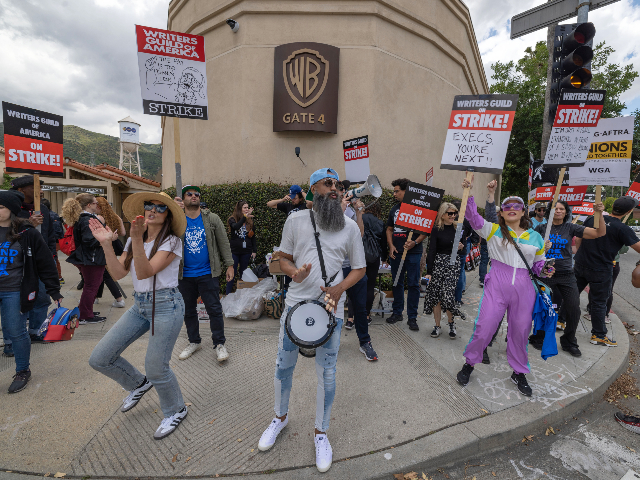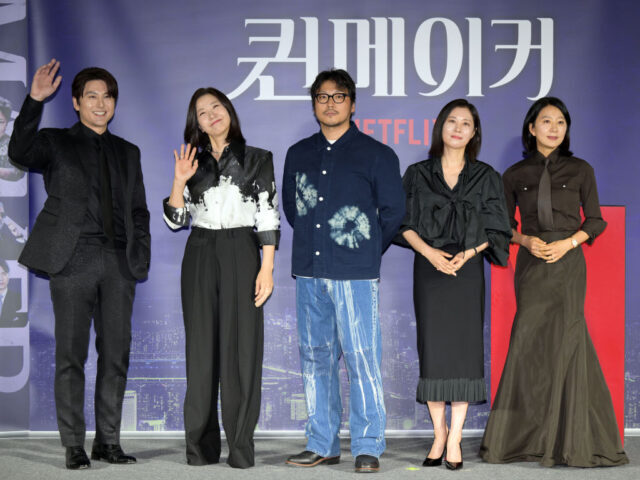Hollywood is nearing the end of a second month of striking by the Writers Guild of America (WGA) – essentially halting production of scripted programming – with little sign of an agreement looming between the writers and major studios and streaming services.
On the contrary, on Tuesday, the threat of A-list actors joining in with a separate strike surfaced in a letter to the leadership of the Screen Actors Guild (SAG), signed by prominent names such as Meryl Streep and Ben Stiller, demanding the leaders resolve longstanding disputes on adequate pay, reasonable work hours, and other labor issues.
The last time the WGA organized a strike, in 2007, television studios responded by flooding America with game shows and reality television. Movie studios had to choose between delaying incomplete productions or, in some unfortunate circumstances, trying to improvise script edits without writers. The impact was fragmented as film studios did not have immediate broadcast needs and the concept of “binging” a television program was, at best, nascent – and certainly not an issue for major television networks.

People picket outside of Warner Bros. Studios on the second day of the Hollywood writers strike on May 3, 2023 in Burbank, California. Scripted TV series, late-night talk shows, film, and streaming productions are being interrupted by the Writers Guild of America (WGA) strike. In 2007 and 2008, a WGA strike shut down Hollywood productions for 100 days, costing the local economy between $2 billion and $3 billion. (Photo by David McNew/Getty Images)
Today, the strike is targeted as much at those traditional media outlets as major online streamers – most prominently Netflix, AppleTV+, and Amazon Prime Video – whose customers demand the constant publishing of new content, both movies and series. And this time around, the streamers appear to be looking beyond dating shows and sports specials and speeding up a trend already rapidly developing before the strike: importing South Korean content. The ploy may not be as easy as uploading ready-made Korean content onto their websites – Korean writers have held solidarity strikes with the WGA and are increasingly decrying streaming contracts as abusive – but the infrastructure to phase out scripted American content and replace it with South Korean imports certainly exists.
South Korea is currently experiencing a cultural renaissance. Its music acts, known commonly as K-pop bands, are breaking international records and attracting millions of fans around the world. South Korean film has dramatically elevated its global profile with an Oscar win – for 2020’s Parasite – and special acclaim for its horror movies, most prominently Oldboy and Train to Busan.
Online streaming services have fed much of the growing Western interest in Korean entertainment. All four of the aforementioned services are preparing to distribute or produce their own Korean television shows. Netflix, arguably at the forefront of promoting Korean shows in America, signed a deal in April, with South Korean President Yoon Suk-yeol present for the announcement, to invest $2.5 billion in developing new South Korean content; shrewd observers noted that talks between the studios and the WGA had already begun to break down when Netflix decided to make the historic investment abroad.
Netflix regularly promotes Korean content to its users and estimates that about 60 percent of customers around the world have watched at least one Korean production. The service began investing in Korean television and films long before competitors, notably agreeing to distribute Okja, a film by Parasite director Bong Joon-ho, in 2017. Its multi-billion-dollar investment announced in April would likely not have happened, however, without Squid Game.
A thriller series about various impoverished Koreans competing in life-or-death games for a gigantic cash prize, Squid Game became a global sensation and is believed to be one of Netflix’s most successful shows ever, including English-language content. Netflix was notoriously opaque about its viewing numbers for over a decade but, after Squid Game, abruptly decided to publish its viewership statistics. Between its debut in September and November 2021, Netflix subscribers watched 43 million hours of Squid Game.

Squid Game’s VFX Supervisor Cheong Jai-hoon, production designer Chae Kyoung-sun, actress Lee Yoo-mi, director Hwang Dong-hyuk, CEO Kim Ji Yeon, stunt performers Lee Tae-young, Kim Cha-I and Shim Sang-min pose during an Emmys celebration press conference on September 16, 2022 in Seoul, South Korea. (Photo by Chung Sung-Jun/Getty Images)
Speaking last month, Netflix CEO Ted Sarandos described the series as “the biggest TV show in history on any metric we’ve ever seen.”
“A staggering 60 percent of our members have now watched one Korean title — with viewing of K-content up sixfold globally in the last four years,” Sarandos explained, speaking in Seoul. “Take just one genre — romance: 90 percent of K-romance viewing now comes from outside Korea. And last year, our Korean movie Carter and two TV shows — All of Us Are Dead and The Glory — hit the Netflix top 10 in over 90 countries. Of course, nothing quite beats Squid Game.”
On Thursday, Netflix revealed that the second season of the program would bring at least eight new protagonists, drawing prominent names in Korean entertainment including rapper T.O.P., a member of one of South Korea’s most successful boy bands, BigBang. Reports indicate that the season will begin filming later this year, a promise of fresh content despite the length of the strike.
Netflix may have been first, but is far from the last to flock to Seoul for fresh productions. In December 2021, two months after the debut of Squid Game, the South Korean news agency Yonhap noted that both Korean streaming services and international outlets were expanding investments in Korean programming.
“Global players like Disney+ and Apple TV+ unveiled plans to make Korean-language shows like ‘Outrun by Running Man,’ a spinoff of the popular TV variety show ‘Running Man,’ and ‘Dr. Brain,’ long before launching their service in Korea,” Yonhap reported.
Disney+ – home to more iconic franchises, brands, and classic children’s entertainment than the other streaming services due to the longevity of its parent corporation – has not prioritized the development of fresh Korean programming. AppleTV+ has had significant success with at least one series, the award-winning drama Pachinko, filmed around the world in English, Korean, and Japanese. Thankfully for the streamer, season two of the series wrapped filming on June 15.
Amazon Prime Video has taken a different approach: rather than create new Korean content, import the content from streamers already active in Korea. A month and a half into the WGA strike, Amazon Prime Video announced it had cut a deal with the Korean streaming service Kocowa to add its services to Prime subscriptions – for an extra fee. With the agreement, Amazon essentially acquired an entire library of scripted content overnight.
Yonhap reported in February that, in the aftermath of the success Netflix has found with Korean programming, Korean streaming services were “turning their eyes abroad” for distribution agreements with international platforms. The push to go global came about, the report claimed, as much from potential international demand as it did from expanding financial losses for the streamers, who were investing heavily in the past year on high-production content but did not have enough subscribers to make up the costs.
Kocowa, the new Amazon partner, was among those profiled expanding internationally. Kocowa, described as U.S.-based, cut a deal last year with the Korean streamer Wavve to expand its Korean offerings to “About 30 countries.”
CJ ENM, the Korean media corporation that owns the streamer Tving, moved to expand its presence outside of South Korea with “a strategic partnership with Paramount Global to collaborate on content production, licensing and distribution, setting a goal of co-producing seven original content releases by 2024,” Yonhap noted.
Paramount+, in turn, would enter the Korean market.
“Paramount+ will be the fourth global streaming service provider operating in South Korea, following Netflix, Disney+, the content streaming service from Walt Disney Co. and Apple TV+, the subscription-based streaming service of tech titan Apple,” Yonhap reported in May.
The rapidly growing presence of Korean programming on American streamers is likely to continue expanding the longer the WGA strike continues. One wrinkle surfacing in the plan to come to a deal with American writers, however, is the fact that Korean writers are increasingly agreeing with the complaints of exploitation and abuse on the part of streaming services and television studios, sympathizing with their American counterparts.
WGA members are protesting demanding larger salaries and a more sustainable work framework. Prior to the advent of “binge-watching,” a television show’s season lasting 22 episodes was extremely common, giving writers an extended period of work. Streaming services have opted for much shorter seasons – some programs debut as little as five episodes at a time – leaving writers with salaries too small to pay their rents and forcing them to find extra work anywhere else. The WGA members are demanding more consistent work and more reasonable salaries, including contracts that give writers a larger share of residuals, the profits from repeat broadcasts or viewings of their work.
“What I’m hearing from membership — the younger writers that are coming into the business that can’t make a living, can’t pay their rent — these short orders, shorter weeks for less pay, for scale, is causing us to lose our middle class,” Dailyn Rodriguez, a writer on strike, told Breitbart News in May. “The streamers have just condensed a business that used be like, you would work for a 22-episode order, which were weeks on end, and you could make a living, and now people aren’t able to make a living.”
Video Source: Paul Bois / Breitbart NewsThe Los Angeles Times spoke to Korean writers who said in a report published last week that they face similar struggles: poor pay, grueling work hours, and the abuse of freelance contracts to deny writers reasonable salaries and benefits.
“Like their U.S. counterparts, South Koreans throughout the nation’s entertainment industry are increasingly questioning the Netflix business model and raising concerns that the country is becoming little more than a bargain bin for the global streamer,” the newspaper reported. “Writers and directors say that lack of residuals should no longer be accepted as the price of admission for working with Netflix, while production workers point to exploitative labor practices that have quietly driven Netflix’s South Korean content boom.”
On June 14, Korean writers organized a picket outside of Netflix’s headquarters in Seoul to support the WGA.
“Streaming services, both international and domestic, are absolutely not paying fair residual compensation,” the four writers’ unions who organized the picket said in a statement. “There are still cases in which Korean broadcasters put clauses saying that ‘all rights revert to the broadcaster’ in under the copyright section of freelancers’ contracts.”
Follow Frances Martel on Facebook and Twitter.

COMMENTS
Please let us know if you're having issues with commenting.